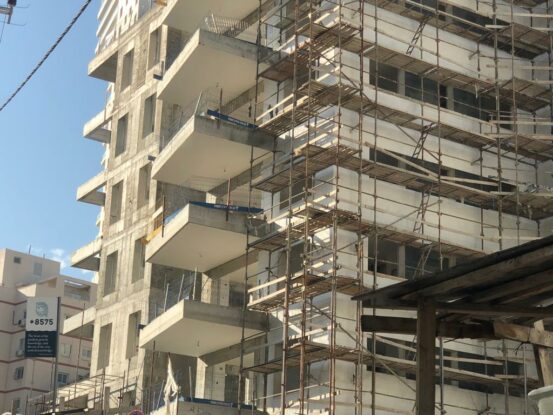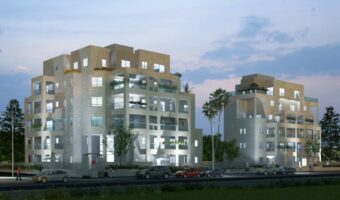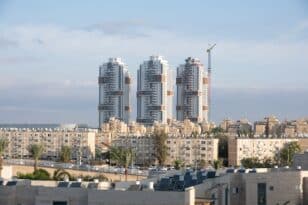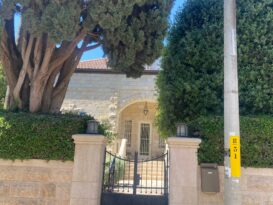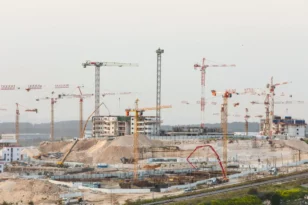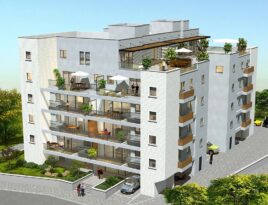CBS: Approximately 65,500 apartments began construction in 2024, marking a slight increase from the previous year, driven by over 20,000 starts in the fourth quarter. Tel Aviv saw a nearly 40% surge in building activity, alongside a 15% rise in urban renewal projects.
By Doron Breutman, Nadlan Center
65,530 apartments began construction in 2024, according to data from the Central Bureau of Statistics (CBS) published today (Thursday). This marks a slight increase of 2.3% compared to last year when 64,083 apartments began construction. On the other hand, the data also includes worrying news, as the number of apartments whose construction was completed stands at 53,420 – a sharp drop of 12.3% compared to the previous year. Additionally, the average construction time for an apartment increased. In 2024, it reached about 34.3 months, nearly 3 years, compared to 32.7 months in 2023. Net housing starts after deducting 5,490 apartments demolished this year as part of renewal processes – stand at 60,040 apartments.
Focusing on the fourth quarter of 2024, there was an increase in activity in the sector, reflected in all indices compared to the third quarter. The number of permits issued stood at 25.7 thousand, a 27% increase from the third quarter and a 21.8% rise compared to last year. Housing starts also grew, reaching 20.2 thousand – a 19.1% increase from the third quarter and 51% compared to the previous year. The number of completed apartments also showed an upward trend this quarter, totaling 15.2 thousand apartments, a 21.4% increase from the previous quarter and an 8.7% decrease from the same quarter last year.
Tel Aviv Returns to the Forefront
By districts, the Central District leads with about 23% of total housing starts, followed by Tel Aviv (21.4%), the South (19.4%), the North (14.5%), Haifa (11%), Jerusalem (9.1%), and Judea and Samaria (1.6%).
By city, Tel Aviv-Yafo saw the highest number of housing starts in 2024, totaling 6,366 apartments. This marks a 37.4% increase from the previous year and Tel Aviv’s return to the top of the list of building cities after losing the lead to Jerusalem last year. Jerusalem follows with 5,183 housing starts, a 12% decrease. A sharp increase of over fivefold was recorded in Ofakim, with 2,516 apartments beginning construction in 2024. Other cities with notable increases include Be’er Ya’akov, with 1,741 apartments (up 259%), and Kiryat Bialik, with 1,264 apartments (up 246.3%).
Sharp Increase in Urban Renewal
In 2024, about 15,710 apartments began construction due to the demolition of an existing building and the construction of a new one, a 14.21% increase from 2023, when 13,753 such apartments were started. Over half (about 53.0%) were built in the Tel Aviv District and about a quarter (25.2%) in the Central District.
Of the apartments started due to demolition and new construction, about 79.8% (12,540) were part of Tama 38/2 and evacuation-reconstruction projects. Additionally, in 2024, about 3,820 apartments began as additions to existing buildings. About 28.8% were in the Tel Aviv District, and about 21.2% in the Northern District. Of these additions, about 46.5% (1,770 apartments) were part of Tama 38.
Less Than 3% of All Construction Designated for Rental
An examination of building permit volumes reveals that in 2024, building permits were issued for 77,060 apartments, a 4.5% increase compared to 2023. Of all apartments for which permits were issued in 2024, about 43.8% were in the Tel Aviv and Central Districts – 22.4% and 21.4%, respectively. In the South District, 18.4% of apartments received permits, followed by the North with 14.1%. In 2024, most districts saw an increase in permitted apartments compared to 2023; Haifa led with a 50.5% rise, followed by the South with 24.3%. Declines in permits were recorded in Jerusalem (20.6%) and the Central District (13.1%).
The data also show that about 28.8% of apartments started in 2024 were not for sale, with about 60.3% built as self-construction, 18.9% through combination deals, and 9.9% intended for rental. This accounts for less than 3% of total new construction.
About 71.2% of the apartments started construction for sale, of which about 11.8% (about 5,500 apartments) were government-subsidized. The highest number of subsidized apartments was in the South District, about 1,810 apartments, accounting for 32.9% of all such construction. The Central District followed with 1,570 apartments, representing 28.5% of subsidized construction.

Nadlan Center is Israel’s leading real estate news and knowledge platform in Hebrew, created for industry professionals. Founded by experts in the field, it delivers in-depth, up-to-date coverage on urban renewal, planning and construction, taxation, and housing policy — tailored to the needs of developers, investors, planners, and financiers. In addition to its widely read news content, Nadlan Center hosts major industry events, professional conferences, and training programs that support the growth and development of the Israeli real estate sector.
Learn more: https://www.nadlancenter.co.il
